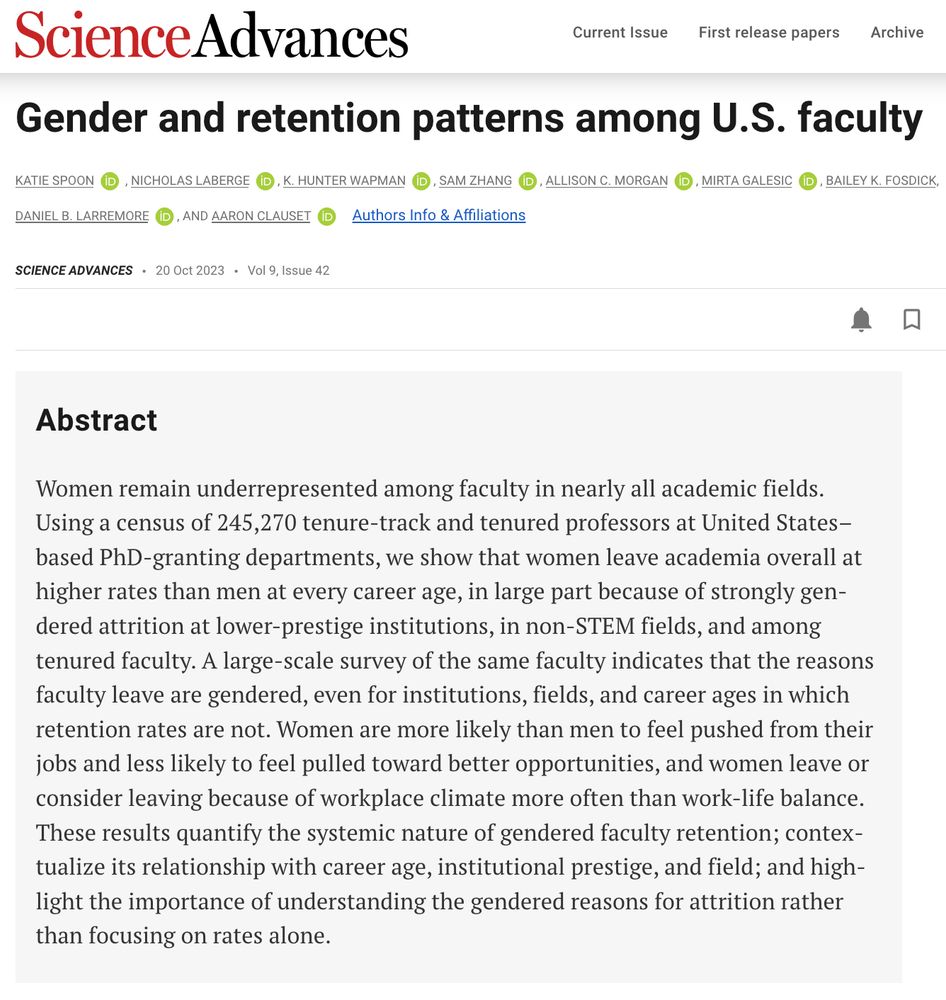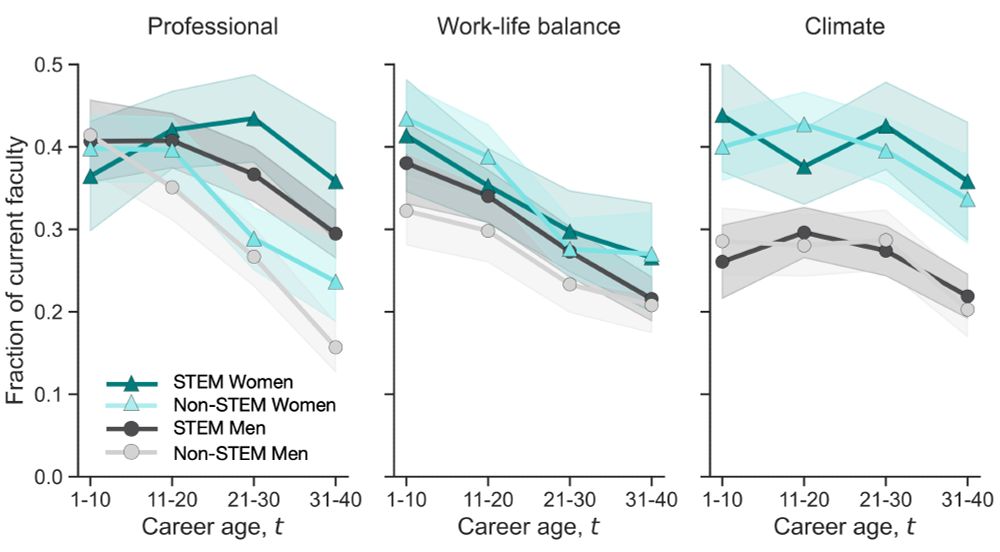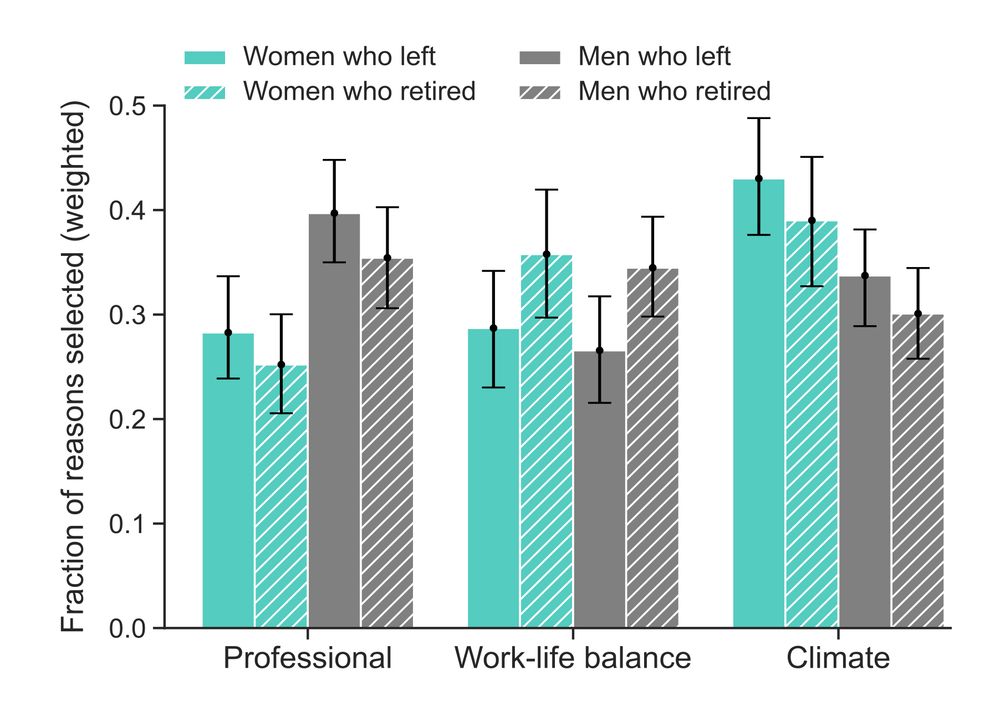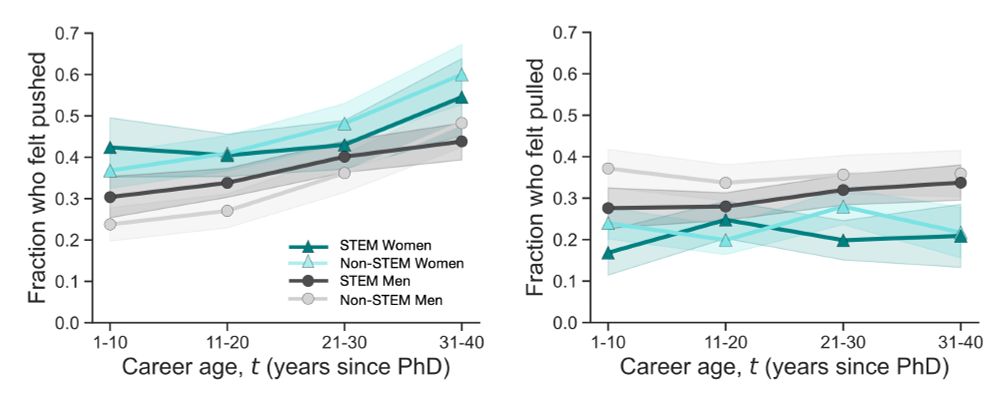Katie Spoon
@kspoon.bsky.social
PhD student in Computer Science & MA student in Education
Data Science Fellow at U.S. Census Bureau
CU Boulder | NSF GRFP | studying inequality in social systems and higher education | she/her | https://katiespoon.github.io/
Data Science Fellow at U.S. Census Bureau
CU Boulder | NSF GRFP | studying inequality in social systems and higher education | she/her | https://katiespoon.github.io/
Bsky thread here bsky.app/profile/kspo...
1/ New paper! “Gender and retention patterns among U.S. faculty” w/ N Laberge KH Wapman @samzhang AC Morgan M Galesic BK Fosdick @danlarremore @aaronclauset: www.science.org/doi/10.1126/...
A systematic study of gendered rates & reasons for faculty attrition in US academia 🧵
A systematic study of gendered rates & reasons for faculty attrition in US academia 🧵

December 24, 2024 at 12:00 AM
Bsky thread here bsky.app/profile/kspo...
In a follow-up study of the same participants we found that women report the devaluation they experience in academia is exacerbated when institutional leadership fails to respond, leading many to leave their jobs
A combo of *both* top-down and bottom-up change is necessary osf.io/preprints/so...
A combo of *both* top-down and bottom-up change is necessary osf.io/preprints/so...
OSF
osf.io
December 19, 2024 at 3:46 PM
In a follow-up study of the same participants we found that women report the devaluation they experience in academia is exacerbated when institutional leadership fails to respond, leading many to leave their jobs
A combo of *both* top-down and bottom-up change is necessary osf.io/preprints/so...
A combo of *both* top-down and bottom-up change is necessary osf.io/preprints/so...
Bsky thread here! bsky.app/profile/kspo...
1/ New paper! “Gender and retention patterns among U.S. faculty” w/ N Laberge KH Wapman @samzhang AC Morgan M Galesic BK Fosdick @danlarremore @aaronclauset: www.science.org/doi/10.1126/...
A systematic study of gendered rates & reasons for faculty attrition in US academia 🧵
A systematic study of gendered rates & reasons for faculty attrition in US academia 🧵

December 10, 2024 at 11:17 PM
Bsky thread here! bsky.app/profile/kspo...
Adding to relevant feeds polisci #AcademicSky #EduSky 💙📚
June 11, 2024 at 4:57 PM
Adding to relevant feeds polisci #AcademicSky #EduSky 💙📚
9/ Finally, this work started at #SICSS 2022 and would not have been possible without @chrisbail.bsky.social bringing us together to learn about computational social science!
We also thank:
📚 PEN America & ALA for monitoring book bans
📚 SSRC for funding
📚 Bookshop.org for generously providing data
We also thank:
📚 PEN America & ALA for monitoring book bans
📚 SSRC for funding
📚 Bookshop.org for generously providing data
June 11, 2024 at 2:52 PM
9/ Finally, this work started at #SICSS 2022 and would not have been possible without @chrisbail.bsky.social bringing us together to learn about computational social science!
We also thank:
📚 PEN America & ALA for monitoring book bans
📚 SSRC for funding
📚 Bookshop.org for generously providing data
We also thank:
📚 PEN America & ALA for monitoring book bans
📚 SSRC for funding
📚 Bookshop.org for generously providing data
8/ We also urge attention toward the children's books that make up the majority of the bans! We were surprised by the titles and stories that populate banned books lists.

June 11, 2024 at 2:49 PM
8/ We also urge attention toward the children's books that make up the majority of the bans! We were surprised by the titles and stories that populate banned books lists.
7/ What does this mean?
As censorship campaigns, book bans are not that effective! But while they might not be effective at information suppression, they play an under-examined role in political mobilization (especially in electorally contentious districts)
As censorship campaigns, book bans are not that effective! But while they might not be effective at information suppression, they play an under-examined role in political mobilization (especially in electorally contentious districts)
June 11, 2024 at 2:48 PM
7/ What does this mean?
As censorship campaigns, book bans are not that effective! But while they might not be effective at information suppression, they play an under-examined role in political mobilization (especially in electorally contentious districts)
As censorship campaigns, book bans are not that effective! But while they might not be effective at information suppression, they play an under-examined role in political mobilization (especially in electorally contentious districts)
6/ Do bans work at suppressing interest in books? Or do they inspire a backlash?
Across two different levels of interest indicators we find that interest in banned books stays consistently low over time. Most people just aren’t reading banned books, before or after bans occur.
Across two different levels of interest indicators we find that interest in banned books stays consistently low over time. Most people just aren’t reading banned books, before or after bans occur.

June 11, 2024 at 2:47 PM
6/ Do bans work at suppressing interest in books? Or do they inspire a backlash?
Across two different levels of interest indicators we find that interest in banned books stays consistently low over time. Most people just aren’t reading banned books, before or after bans occur.
Across two different levels of interest indicators we find that interest in banned books stays consistently low over time. Most people just aren’t reading banned books, before or after bans occur.
5/ What counties ban books?
We find that one of the strongest predictors that a county bans books is a *decreasing* republican vote share over the past 20 years. Precarious conservative majorities, not Republican strongholds, are the most likely to ban books.
We find that one of the strongest predictors that a county bans books is a *decreasing* republican vote share over the past 20 years. Precarious conservative majorities, not Republican strongholds, are the most likely to ban books.

June 11, 2024 at 2:46 PM
5/ What counties ban books?
We find that one of the strongest predictors that a county bans books is a *decreasing* republican vote share over the past 20 years. Precarious conservative majorities, not Republican strongholds, are the most likely to ban books.
We find that one of the strongest predictors that a county bans books is a *decreasing* republican vote share over the past 20 years. Precarious conservative majorities, not Republican strongholds, are the most likely to ban books.
4/ And which authors write banned books?
Women and LGBTQ+ authors are slightly overrepresented, but authors of color are strongly overrepresented among banned authors.
The odds that an author of color is banned is:
4x a white author (among all authors)
12x a white author (among popular authors)
Women and LGBTQ+ authors are slightly overrepresented, but authors of color are strongly overrepresented among banned authors.
The odds that an author of color is banned is:
4x a white author (among all authors)
12x a white author (among popular authors)

June 11, 2024 at 2:44 PM
4/ And which authors write banned books?
Women and LGBTQ+ authors are slightly overrepresented, but authors of color are strongly overrepresented among banned authors.
The odds that an author of color is banned is:
4x a white author (among all authors)
12x a white author (among popular authors)
Women and LGBTQ+ authors are slightly overrepresented, but authors of color are strongly overrepresented among banned authors.
The odds that an author of color is banned is:
4x a white author (among all authors)
12x a white author (among popular authors)
3/ First, what books get banned?
We find most banned books are children’s books featuring diverse characters, such as LGBTQ+ characters and characters of color. In contrast, popularly discussed banned books such as young adult queer romance novels only made up a small proportion of banned books.
We find most banned books are children’s books featuring diverse characters, such as LGBTQ+ characters and characters of color. In contrast, popularly discussed banned books such as young adult queer romance novels only made up a small proportion of banned books.

June 11, 2024 at 2:38 PM
3/ First, what books get banned?
We find most banned books are children’s books featuring diverse characters, such as LGBTQ+ characters and characters of color. In contrast, popularly discussed banned books such as young adult queer romance novels only made up a small proportion of banned books.
We find most banned books are children’s books featuring diverse characters, such as LGBTQ+ characters and characters of color. In contrast, popularly discussed banned books such as young adult queer romance novels only made up a small proportion of banned books.
2/ We combine data on books banned in the 2021-2022 school year with data on school districts and counties, book metadata, a crowdsourced author demographic dataset, and several measures of public interest in books (book sales and Google searches) to systematically describe this recent phenomenon
June 11, 2024 at 2:34 PM
2/ We combine data on books banned in the 2021-2022 school year with data on school districts and counties, book metadata, a crowdsourced author demographic dataset, and several measures of public interest in books (book sales and Google searches) to systematically describe this recent phenomenon
15/ Finally, we want to thank Academic Analytics Research Center for the employment data and all survey participants for their valuable time.
October 20, 2023 at 6:42 PM
15/ Finally, we want to thank Academic Analytics Research Center for the employment data and all survey participants for their valuable time.
14/ Big takeaway: it’s a mistake to observe equal rates of attrition and believe gender equity has been achieved. Focus instead on the reasons for leaving, which vary by career age, field, and prestige. There’s a lot of work left to do, and climate deserves our attention 🎤
October 20, 2023 at 6:41 PM
14/ Big takeaway: it’s a mistake to observe equal rates of attrition and believe gender equity has been achieved. Focus instead on the reasons for leaving, which vary by career age, field, and prestige. There’s a lot of work left to do, and climate deserves our attention 🎤
13/ Our study is limited in several ways: our data don’t span the COVID pandemic, we study only tenured & tenure-track faculty, and our data don’t support strong intersectional analyses so the results mostly reflect the experiences of white women.
October 20, 2023 at 6:41 PM
13/ Our study is limited in several ways: our data don’t span the COVID pandemic, we study only tenured & tenure-track faculty, and our data don’t support strong intersectional analyses so the results mostly reflect the experiences of white women.
12/ To sum up:
- Women faculty universally leave academia at higher rates than men
- Effect is stronger for tenured women in non-STEM at lower-prestige schools
- BUT regardless of rates, women leave for different reasons - they feel pushed out, esp. by their workplace climates
- Women faculty universally leave academia at higher rates than men
- Effect is stronger for tenured women in non-STEM at lower-prestige schools
- BUT regardless of rates, women leave for different reasons - they feel pushed out, esp. by their workplace climates
October 20, 2023 at 6:41 PM
12/ To sum up:
- Women faculty universally leave academia at higher rates than men
- Effect is stronger for tenured women in non-STEM at lower-prestige schools
- BUT regardless of rates, women leave for different reasons - they feel pushed out, esp. by their workplace climates
- Women faculty universally leave academia at higher rates than men
- Effect is stronger for tenured women in non-STEM at lower-prestige schools
- BUT regardless of rates, women leave for different reasons - they feel pushed out, esp. by their workplace climates
11/ And current faculty report a very similar pattern: women cite climate reasons at much higher rates than men, and do so at all career ages. Work-life reasons are more common in the early career, and do show a gendered effect but not as large as we see for climate.

October 20, 2023 at 6:41 PM
11/ And current faculty report a very similar pattern: women cite climate reasons at much higher rates than men, and do so at all career ages. Work-life reasons are more common in the early career, and do show a gendered effect but not as large as we see for climate.
10/ Second, are faculty’s reasons for leaving gendered? Yes. Women former faculty most often cited climate-related reasons, while men cited professional reasons 📈📉 Women and men former faculty selected work-life balance reasons equally often.

October 20, 2023 at 6:40 PM
10/ Second, are faculty’s reasons for leaving gendered? Yes. Women former faculty most often cited climate-related reasons, while men cited professional reasons 📈📉 Women and men former faculty selected work-life balance reasons equally often.
9/ First, feeling “pushed out” increased with career age for everyone. But women (STEM & non-STEM) were more likely to feel pushed out & less likely to feel pulled towards better jobs, than men, at every career age – gender was the strongest predictor of feeling pushed vs pulled.


October 20, 2023 at 6:40 PM
9/ First, feeling “pushed out” increased with career age for everyone. But women (STEM & non-STEM) were more likely to feel pushed out & less likely to feel pulled towards better jobs, than men, at every career age – gender was the strongest predictor of feeling pushed vs pulled.
8/ More than 10K faculty responded to our attrition survey, answering (1) did they feel pushed out or pulled towards better opportunities? and (2) were their pushes related to work, work-life balance, or workplace climate?

October 20, 2023 at 6:40 PM
8/ More than 10K faculty responded to our attrition survey, answering (1) did they feel pushed out or pulled towards better opportunities? and (2) were their pushes related to work, work-life balance, or workplace climate?

